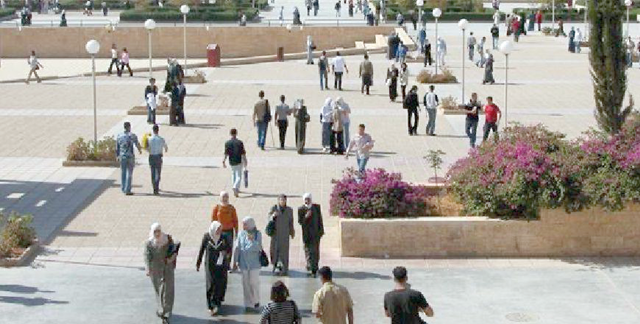You are here
‘Fundamental’ fiscal reforms vital in reducing unemployment rate — economists
By Mays Ibrahim Mustafa - Jan 07,2023 - Last updated at Jan 07,2023

The unemployment rate for female holders of university degrees stood at 81.8 per cent in the third quarter of 2022, while that of their male counterparts totalled 29.5 per cent, according the Department of Statistics (File photo)
AMMAN — Reducing the unemployment rate in Jordan demands“fundamental” fiscal reforms, such as reviewing capital expenditure, increasing wages and lowering taxes, say economists.
In the third quarter of 2022, Jordan’s unemployment rate stood at 23.1 per cent, marking a 0.5 per cent increase compared with the second quarter of 2022, the Department of Statistics (DoS) revealed on Thursday.
Economist Fahmi Katout noted that the Kingdom’s unemployment rate is closely linked to its economic growth rate.
The unemployment rate has been on the rise since 2010, and the economic growth rate has been “at a standstill” for the past 10 years, ranging between 2.5 and 2.7 per cent, which is “not high enough to create jobs”, he told The Jordan Times.
The low percentage of capital expenditure in the general budget has weakened the “competitiveness and growth” of Jordan’s economy, which has been in turn reflected on unemployment rates, he added.
Over the past 10 years, capital expenditure decreased from around 20 per cent to around 13 per cent of total public spending, while wages and debt interest comprise 82 per cent of current governmental expenditures, which is “worrying”, according to Katout.
He also stressed that there is an urgent need to work towards stimulating productive sectors, as “economic growth requires an increase in an economy’s capacity to produce”.
This requires reducing the high taxation burden, especially the tax on oil derivatives and the sales tax, which are increasing production costs and lowering citizens’ purchasing power, he said.
Economist Mohammad Al Basheer said that the Department of Statistic’s (DoS) report is indicative of an economic downturn, which can be traced back to the “humble” contribution of the agricultural and industrial sectors to the Kingdom’s gross domestic product (GDP).
It is “necessary to revive and invest in productive sector to create jobs” through reducing taxes and interest rates, which are eroding the purchasing power of local consumers, he told The Jordan Times.
The total loan debt owed to banks that has been accrued by individuals in Jordan exceeds JD11 billion, according to Basheer.
Economic expert Hosam Ayesh said that the high unemployment rate among university graduates, especially females, is “concerning”.
The unemployment rate for female holders of university degrees stood at 81.8 per cent in the third quarter of 2022, while that of their male counterparts totalled 29.5 per cent, according the DoS.
This is “telling” of the nature of the Jordanian labour market, which mainly produces jobs and professions that require low-skilled workers, failing to match the expertise and knowledge of a large number of job seekers, he told The Jordan Times.
Ayesh pointed out the need to restructure higher education in a manner that ensures that its outcomes align with the needs of the local and global labour market, which are continuously changing. “It has become necessary to equip youth with the ability to establish and lead small- and medium-sized enterprises (SMEs) that offer a solution to the issue of unemployment,” he said.
Ayesh also noted that “access to affordable and reliable transportation is a main hindrance to the participation of youth — both males and females — in the labour force, where the majority of jobs offer low wages along with little to no prospects for career advancement or acquiring new skills and training”.
According to Ayesh, a high unemployment rate is “the ultimate hallmark of a recession”, indicating a decrease in the economy’s competitiveness and its ability to generate enough jobs.
Economist Ahmad Awad said that the numbers in the DoS’ report, which “speak for themselves”, necessitate reconsidering the sustainability of national employment programmes, which cost tens of millions, as well as increasing wages, reducing taxes and reviewing labour market policies.
“Raising wages is an effective fiscal tool that a government can employ to immediately stimulate the economy by increasing consumer spending,” he told The Jordan Times.
Awad also noted that stimulating aggregate demand, which entails increasing spending on produced goods and services, will propel economic growth.
Statistics show that 55 per cent of the formal workforce in Jordan are paid a salary equal to or less than JD500 per month, which is equal to the poverty line for households with five persons or more, according to Awad.
“This number means that their consumption capacity and contribution to domestic demand is humble,” he said.
The 81.8 per cent rate of unemployment among female university graduates is also “unprecedented and worrying”, he added.
Barriers to women’s economic participation include the gender wage gap, along with persisting socio-economic constraints, such as access to affordable childcare and safe transportation as well as violations of social protection entitlements like social security subscriptions and health coverage in the private sector, according to Awad.
The unemployment rate for females stood at 33.1 per cent, increasing by 3.7 per cent compared with the second quarter of 2022, the DoS report showed.
Related Articles
AMMAN — There were 419,000 unemployed people in Jordan as of the end of last year, according to data from the Department of Statistics (DoS)
AMMAN — The Kingdom’s minimum wage, currently set at JD260 for Jordanian workers and at JD230 for foreign workers, is not sufficient to cove
AMMAN — The unemployment rate in the Kingdom went down by 0.1 per cent in the third quarter of 2022 to reach 23.1 per cent, compared with th












